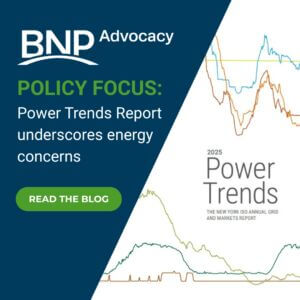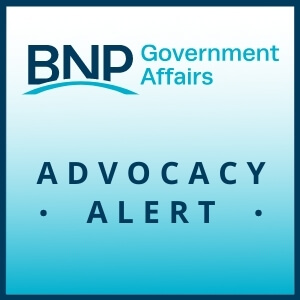Policy focus: Power Trends Report underscores energy concerns
The Partnership
June 12, 2025
Blog Categories
 This week, the New York Independent System Operator released its annual Power Trends report, which details the state of New York’s electric grid. The report’s findings are concerning and underscore the need for a more sensible approach to climate and energy policy. This week, the New York Independent System Operator released its annual Power Trends report, which details the state of New York’s electric grid. The report’s findings are concerning and underscore the need for a more sensible approach to climate and energy policy.
Why Do Employers Care? Ensuring adequate energy supply is an economic development imperative. To attract, retain, and grow businesses in our region, employers must have the confidence that the grid can supply their businesses’ energy demands. If not, they will look elsewhere. “Shrinking reliability margins” is not a phrase that inspires confidence in investors, site selectors, or Buffalonians in a blizzard. Demand Up, Supply Down Businesses are becoming increasingly energy intensive. Accordingly, there is considerably more demand on the grid than in prior years. The report notes: “requests from data centers, high-performance computing projects and chip manufacturing [have] grown dramatically in recent years. 19 projects are currently requesting to connect to the grid for a total incremental load of 3,000 MW. The timing of these projects will have major impacts on system risk, highlighting the need for large investment in energy infrastructure.” Moreover, as state climate policy aims to replace gas-powered equipment with electric (vehicles, appliances, heating systems, etc.), the demand for electricity will increase – and not just marginally. According to the report, if the state pursues full electrification, grid demands could double over the next twenty years. The need for power is higher than ever and will only grow. Meeting that demand will require a Herculean effort to expand the grid. However, New York is going in the wrong direction. According to the report, since 2019, New York has added 2,274 MW of generating capacity, but deactivated 4,315 MW – a net decrease of 2,041 MW. The decrease is because the state shuttered nuclear and natural gas electric generating facilities during this timeframe. Less Reliable Grid
Power producers and energy utilities are working overtime to address these challenges by adding new generating capacity, expanding transmission infrastructure, and promoting efficiency upgrades. However, sound public policymaking is needed to ensure energy remains affordable and reliable. How Should Policymakers Respond? The BNP’s energy advocacy is crafted with these grid realities in mind. Consistent with our Advocacy Agenda, lawmakers should:
Questions? Email Director of Government Affairs Josh Veronica at JVeronica@thepartnership.org. |
Related Posts
11.18.21 COVID-19 Bulletin: OSHA’s Vax/Test Mandate Paused Amid Legal Limbo
The Occupational Safety and Health Administration (OSHA) announced it is pausing implementation and enforcement of its COVID-19 Vaccine and Testing Emergency Temporary Standard. Per OSHA’s website:
11.18.21 COVID-19 Bulletin: OSHA’s Vax/Test Mandate Paused Amid Legal Limbo
Yesterday, Governor Kathy Hochul announced she would repeal the state’s mask mandate, effective today. However, her announcement did not proactively address how the repeal coincided with the NY HERO Act, which would have required employees in most workplaces to continue masking.
11.15.21 Advocacy Alert: BIDEN SIGNS INFRASTRUCTURE INVESTMENT BILL
On November 15th, President Joe Biden signed the bipartisan Infrastructure Investment and Jobs Act into law.
The BNP advocated for this important legislation, which will make critical investments in our roads, bridges, water infrastructure, electric grid, and broadband while allowing our community to pursue landmark projects. Importantly, the bill makes these investments without raising taxes.
11.8.21 Advocacy Alert: House Passes Bipartisan Infrastructure Bill
This weekend, the U.S. House of Representatives passed the bipartisan infrastructure bill, known as the Infrastructure Investment and Jobs Act. The bill’s passing is a significant milestone after months of contentious negotiations.
The bill would invest in roads, bridges, water and wastewater systems, airports, broadband, and the electric grid.

 The result of all of this: New York is experiencing
The result of all of this: New York is experiencing 

